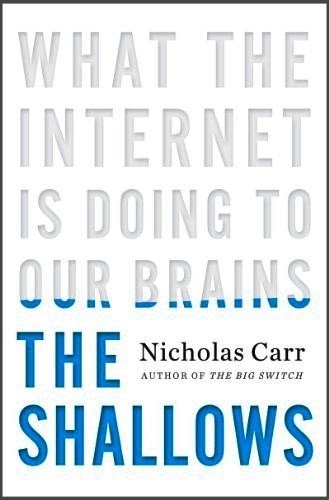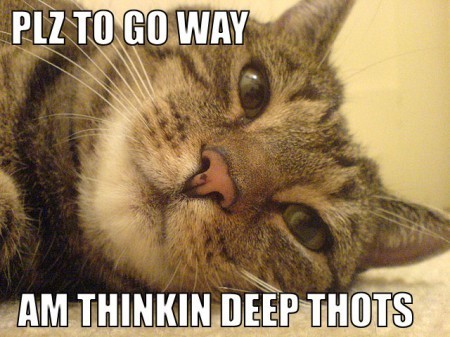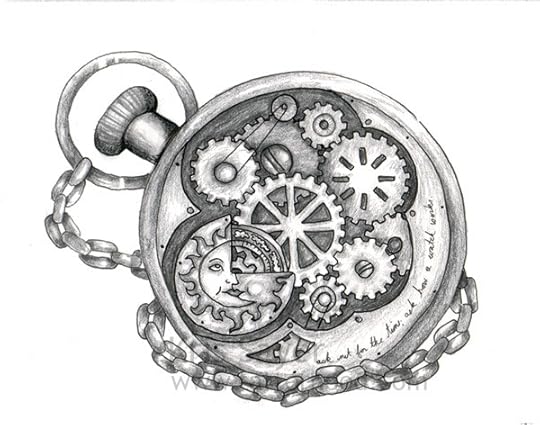Literacy 2.Ooh Shiny!
One of today’s Fresh Pressed is the intriguingly-titled “Short Attention Span Theater or Why My Students Can’t Read Books.” It’s a review of a book called The Shallows: What the Internet is Doing to Our Brains, by Nicholas Carr. Carr’s thesis is that the Internet as a medium (not in terms of content) is changing the way we think, specifically that it encourages distraction, rather than sustained focus. Carr cites some scientific studies that extensive internet use can aggravate attention defici-ooh, shiny! and reduces memory function.

Let me put that one again: Carr’s concern, backed by scientific studies, is that extensive users of the Internet (i.e. you) have atrophied or underdeveloped abilities to concentrate, remember, and pay attention. I’d like to also reference this article from Stanford, about the limits of (media) multitasking and distractibility. If those don’t sound familiar, you haven’t been following along. 
Carr and Joseph, the blogger over at lovemesomebooks, take pains to point out that Carr’s thesis is far more nuanced than the usual brand of techno-alarmism. But if Carr’s concerns are valid, then applying mnemonics, meditating, petit perception and simulflow may actually help to correct some of the downsides of a wired existence. In the “grazing to deep reading” sense, it might be the best of both worlds: the technological tools to access wide and varied sources of information, even on a single topic, and the personal tools to resist the drive to distraction that such access brings.
How does media affect this, then? According to Carr, the Internet is a “distraction device.” Between the Skype pings, open tabs, and the monster that is TVTropes, the Internet is very, very good at getting you to come to the table and sample everything. In Steven Berlin Johnson’s terms, you are “skimming the surface of the incoming data, picking out the relevant details, and moving on to the next stream. You’re paying attention, but only partially. That lets you cast a wider net, but it also runs the risk of keeping you from really studying the fish.” And the economic, technological, and social bases of the Internet are geared towards making it more distracting over time. Your friends want to contact you. Google wants you to go to more websites so they can generate more ads. The Internet itself is based on multiple servers and users going at once (is that what ‘cloud computing’ is? I have no idea).
A book, by contrast, is a lot of text, by itself, usually on a single topic. There are no links. You can’t open another tab or another browser. It does not, itself, interrupt you in any way. And the social expectation isn’t that you’ll flip a couple of pages and move on to the next one. No, you’re expected to “sit down with a good book.” You expect to focus on it for a long period of time, to a greater or lesser degree exclusively. Books encourage deep reading in a way that the Internet simply doesn’t, but that’s all right, because the Internet encourages fact-checking and follow-up questions in a way that books simply don’t.

Speaking of, there’s a lot of discussion over there about “deep reading” and its (apparently quite close) companion “deep thinking.” Since I didn’t see a definition forthcoming, I hunted up the terms on Google, like any good member of the Social Generation. After wading through the Wikipedia article and a few irrelevancies, I found this article, from March 1997, on the subject of deep reading in the information age.
The phrase has taken on a few Luddite, a few slow-local shades of meaning since then, but in “Deep Thinking and Deep Reading in an Age of Info-Glut, Info-Garbage and Info-Tactics,”(1) the author says that deep reading, as they define it, “does not require continuing active eye contact with printed or electronic text. It may be contact with text or it may be reflection aimed at resolving some unanswered question, issue or dilemma.” That is, holding a question in mind, and keeping it there, much like the question “Who Am I?” in neti neti meditation. It is the capacity to focus, to control one’s attention, that makes for deep reading, not whether it is a book or a screen you’re looking at, or indeed if you’re looking at anything at all.
In that essay, the author also discusses (and provides links to definitions of) what they call “the post-modem skills array”(2). Among others are “seeing and finding what’s missing,” such as Harry Lorayne’s card trick (where he calls out what cards are missing from a deck recited to him), and analyzing data, a process aided by attention to detail and a good memory.
My answer to Joseph (and Carr, once I get a copy of the book and double-check that I’m reading it right) is that the downsides of extensive internet use can be mitigated by good off-line education. Through both Learning to Think and learning to think, by focusing on finding the right questions and keeping one’s analytical and synthetical skills sharp, a person can make effective use of information technology of all stripes. They can graze their way to deep thought.
By the way…
…how many of you read this in one sitting, and how many of you nipped off to check Facebook, read the latest Girl Genius or look up something on Wikipedia first? 

–
1 – What is now usually termed “information pollution.”
2 – Or “thinking skills” to you and I.





